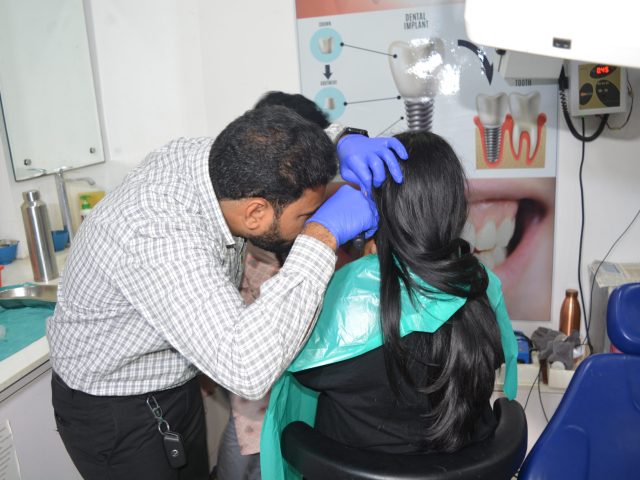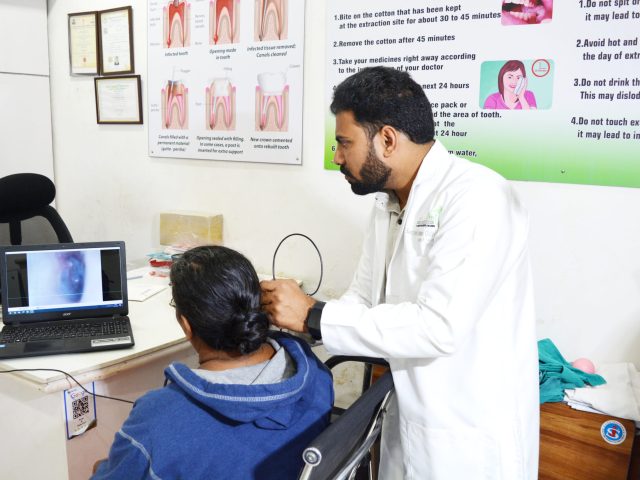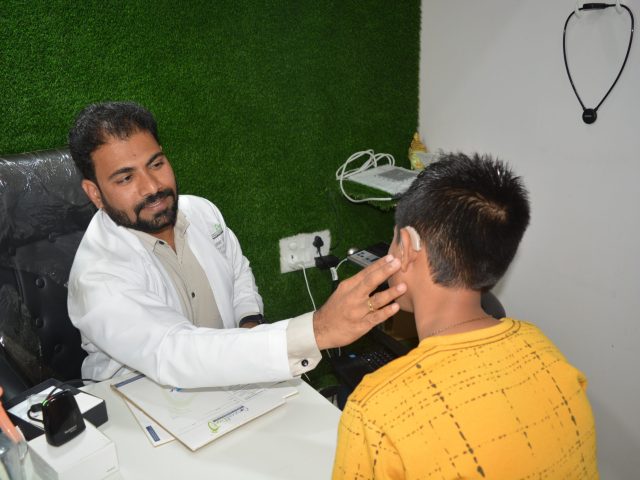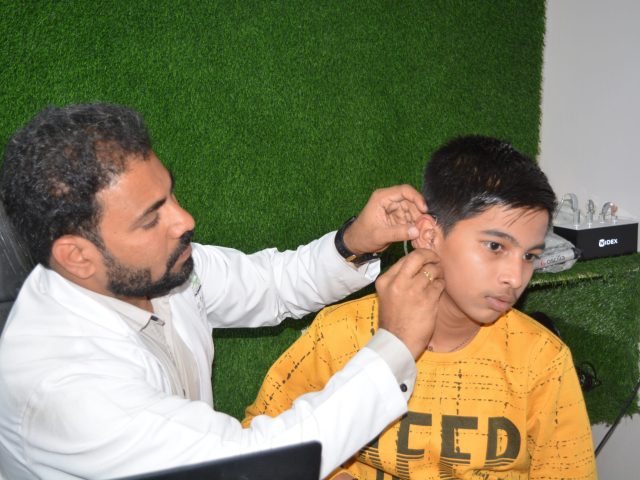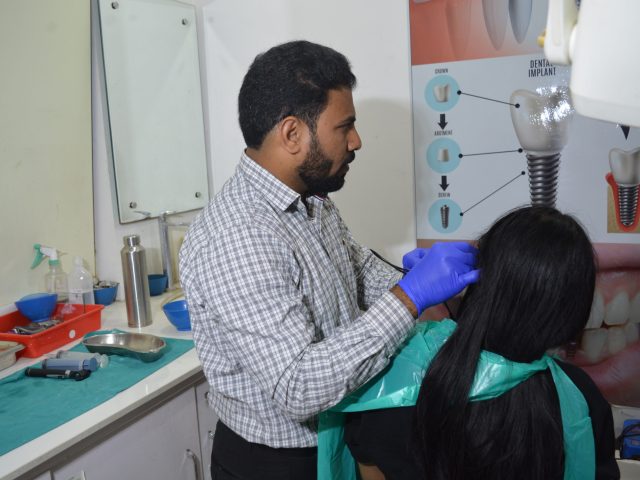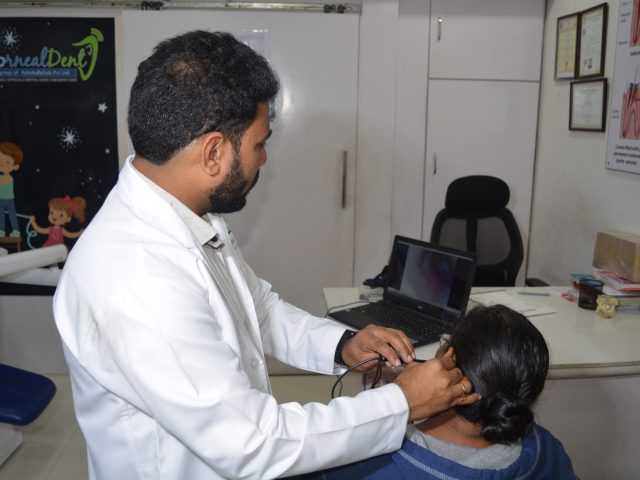hEARING CARE
HEARING CARE:
Hearing is one of our most important senses, allowing us to communicate, learn, and interact with the world around us. However, hearing loss is a common problem that affects millions of people worldwide, and can have a profound impact on quality of life.
Hearing care is the process of maintaining and improving hearing health, and includes a range of services such as hearing screenings, hearing aid fittings, and rehabilitation programs. It is important to seek hearing care early, as early intervention can prevent further hearing loss and improve outcomes.
Hearing loss can be caused by a variety of factors, including aging, exposure to loud noise, genetics, and certain medical conditions. It is important to take steps to protect your hearing, such as wearing earplugs or earmuffs in noisy environments, and avoiding prolonged exposure to loud noise.
If you suspect you may have hearing loss, it is important to seek a hearing evaluation from a qualified hearing healthcare professional. The evaluation will assess the extent and type of hearing loss, and determine the most appropriate treatment options.
Hearing aids are a common treatment option for hearing loss, and modern hearing aids are highly advanced and offer a range of features such as noise reduction, wireless connectivity, and customized programming. Hearing aids can significantly improve quality of life and communication ability for those with hearing loss.
In addition to hearing aids, there are a range of rehabilitation programs available to help individuals with hearing loss improve their communication skills and adjust to living with hearing loss. These programs may include speech therapy, communication strategies, and hearing assistive technology.
Overall, hearing care is an important aspect of maintaining overall health and wellbeing. By seeking early intervention and taking steps to protect your hearing, you can maintain good hearing health and enjoy all the benefits of good communication and interaction with the world around you.
Hearing is an essential sense that allows us to communicate with the world around us. However, many people take their hearing for granted and fail to take care of it properly. With an estimated 466 million people worldwide suffering from hearing loss, hearing care has become a critical issue.
Hearing loss can occur due to various factors such as aging, exposure to loud noise, genetics, infections, and medication. It can affect people of all ages and can have significant impacts on their quality of life, including communication difficulties, social isolation, and reduced job opportunities.
To ensure good hearing health, it is essential to practice regular hearing care. Here are some tips for taking care of your hearing:
Protect your ears from loud noise: Exposure to loud noise can damage your hearing permanently. Wear earplugs or earmuffs when exposed to loud noise levels, such as concerts or machinery.
Keep your ears dry: Moisture in the ears can lead to infections, which can cause hearing loss. Dry your ears thoroughly after swimming or showering.
Avoid using cotton swabs: Cotton swabs can push earwax further into the ear canal, leading to blockages and hearing loss. Instead, use a damp cloth to clean the outer ear.
Get your hearing checked regularly: Regular hearing tests can help detect hearing loss early and prevent further damage. It is recommended to have a hearing test at least once every ten years before the age of 50 and every three years thereafter.
Practice healthy habits: Healthy habits, such as exercising regularly, maintaining a healthy weight, and not smoking, can also benefit your hearing health.
In addition to these tips, seeking professional help from an audiologist can help prevent or manage hearing loss. An audiologist can perform a comprehensive hearing evaluation, recommend appropriate hearing aids or assistive listening devices, and provide counseling on hearing care and communication strategies.
In conclusion, hearing care is crucial for maintaining good hearing health. By following these tips and seeking professional help when necessary, you can protect your hearing and prevent further damage. Take care of your hearing, and it will take care of you.
Hearing is one of our most important senses, yet it is often taken for granted until we begin to experience problems. Hearing loss affects millions of people worldwide, and it can have a significant impact on quality of life. Fortunately, with proper hearing care, many hearing issues can be prevented or effectively managed.
Hearing care encompasses a range of practices and services aimed at promoting healthy hearing and addressing hearing-related concerns. These can include regular hearing screenings, hearing aid fittings, communication strategies, and counseling and support for those with hearing loss.
One of the most important aspects of hearing care is prevention. Regular hearing screenings can help identify potential hearing issues before they become more severe, allowing for early intervention and management. People of all ages should have their hearing tested regularly, but it is especially important for older adults, who are at increased risk for age-related hearing loss.
Another key component of hearing care is hearing aid fittings. Hearing aids are small devices that can help amplify sound and improve communication for people with hearing loss. However, selecting and fitting the right hearing aid can be a complex process, and it is important to work with a qualified audiologist or hearing healthcare professional to ensure the best outcomes.
Communication strategies are also an important part of hearing care. For people with hearing loss, communicating with others can be challenging, and it may require some adjustments to ensure effective communication. This can include using visual cues, speaking clearly and slowly, and avoiding noisy environments whenever possible.
For those with hearing loss, counseling and support can also be helpful in adjusting to their new reality. Hearing loss can be a difficult and isolating experience, but support groups and counseling can provide valuable emotional support and guidance.
In conclusion, hearing care is an essential part of maintaining overall health and well-being. By taking steps to prevent hearing loss, identifying and managing hearing issues, and utilizing effective communication strategies, people can improve their quality of life and continue to enjoy all the sounds and experiences that life has to offer.
Hearing Care: Why It’s Important and How to Take Care of Your Ears
Hearing is an essential sense that allows us to communicate, socialize, and enjoy the sounds of the world around us. However, many people take their hearing for granted and do not prioritize hearing care until they start to experience hearing loss or other ear-related problems. In this article, we will discuss why hearing care is important and provide tips on how to take care of your ears.
Why is hearing care important?
Hearing care is crucial for several reasons. Firstly, hearing loss can significantly impact your quality of life. It can lead to social isolation, depression, and anxiety, and it can also affect your ability to work and communicate effectively. Secondly, hearing loss can be caused by various factors, including aging, noise exposure, and certain medical conditions. Therefore, taking care of your ears can help prevent or minimize the risk of hearing loss. Lastly, hearing care can also help identify and treat ear-related problems early, preventing further complications.
Tips for taking care of your ears
Here are some tips on how to take care of your ears:
Protect your ears from loud noises. Loud noises can damage your hearing, so it is important to protect your ears from loud noises as much as possible. Wear earplugs or earmuffs when exposed to loud noises, such as at concerts, sporting events, or in noisy workplaces.
Clean your ears properly. While it is essential to keep your ears clean, it is also important not to overdo it. Over-cleaning can damage the delicate skin in your ear canal and lead to infections. Use a damp cloth or a gentle ear cleaning solution to clean the outer part of your ear, and avoid using cotton swabs or other objects to clean your ear canal.
Monitor your hearing. Pay attention to any changes in your hearing and seek medical attention if you notice any issues. Regular hearing tests can also help identify hearing loss early.
Maintain a healthy lifestyle. Certain lifestyle factors, such as smoking and excessive alcohol consumption, can increase the risk of hearing loss. Maintaining a healthy lifestyle, including a balanced diet, regular exercise, and avoiding smoking and excessive alcohol, can help protect your hearing.
Seek professional help when needed. If you experience any ear-related problems, such as pain, discharge, or hearing loss, seek medical attention as soon as possible. A qualified audiologist or ENT doctor can diagnose and treat ear-related problems effectively.
In conclusion, hearing care is crucial for maintaining good hearing health and preventing hearing loss. By following the tips above and taking care of your ears, you can protect your hearing and enjoy the sounds of the world around you for years to come.
Hearing is one of the most important senses that humans have. It allows us to communicate, navigate our surroundings, and enjoy the sounds of the world around us. Unfortunately, hearing loss is a common problem that affects millions of people worldwide. In fact, according to the World Health Organization, approximately 466 million people worldwide have disabling hearing loss, and this number is expected to increase to over 900 million by 2050.
Hearing care is the practice of addressing and treating hearing loss and related conditions. This can include the use of hearing aids, cochlear implants, and other assistive devices, as well as various forms of therapy and counseling.
The first step in hearing care is to have a hearing evaluation, which is typically conducted by an audiologist or other trained hearing healthcare professional. During the evaluation, the individual’s hearing is assessed using a series of tests that evaluate their ability to hear sounds of different frequencies and volumes.
If the evaluation reveals that the individual has hearing loss, the hearing healthcare professional will work with them to determine the best course of treatment. This may include the use of hearing aids, which are small electronic devices that are worn in or behind the ear and amplify sounds for the wearer.
Cochlear implants may also be used in cases of severe hearing loss. These devices are surgically implanted in the inner ear and stimulate the auditory nerve directly, bypassing the damaged parts of the ear.
In addition to these treatments, hearing care may also involve various forms of therapy and counseling. This can include speech therapy to help individuals with hearing loss learn to communicate effectively, as well as counseling to help them cope with the emotional and social challenges that can come with hearing loss.
Hearing care is essential for anyone who is experiencing hearing loss or related conditions. By seeking out the appropriate treatment and support, individuals with hearing loss can improve their quality of life and continue to enjoy the sounds of the world around them.
HEARING CARE









Please Call Us For More Info

